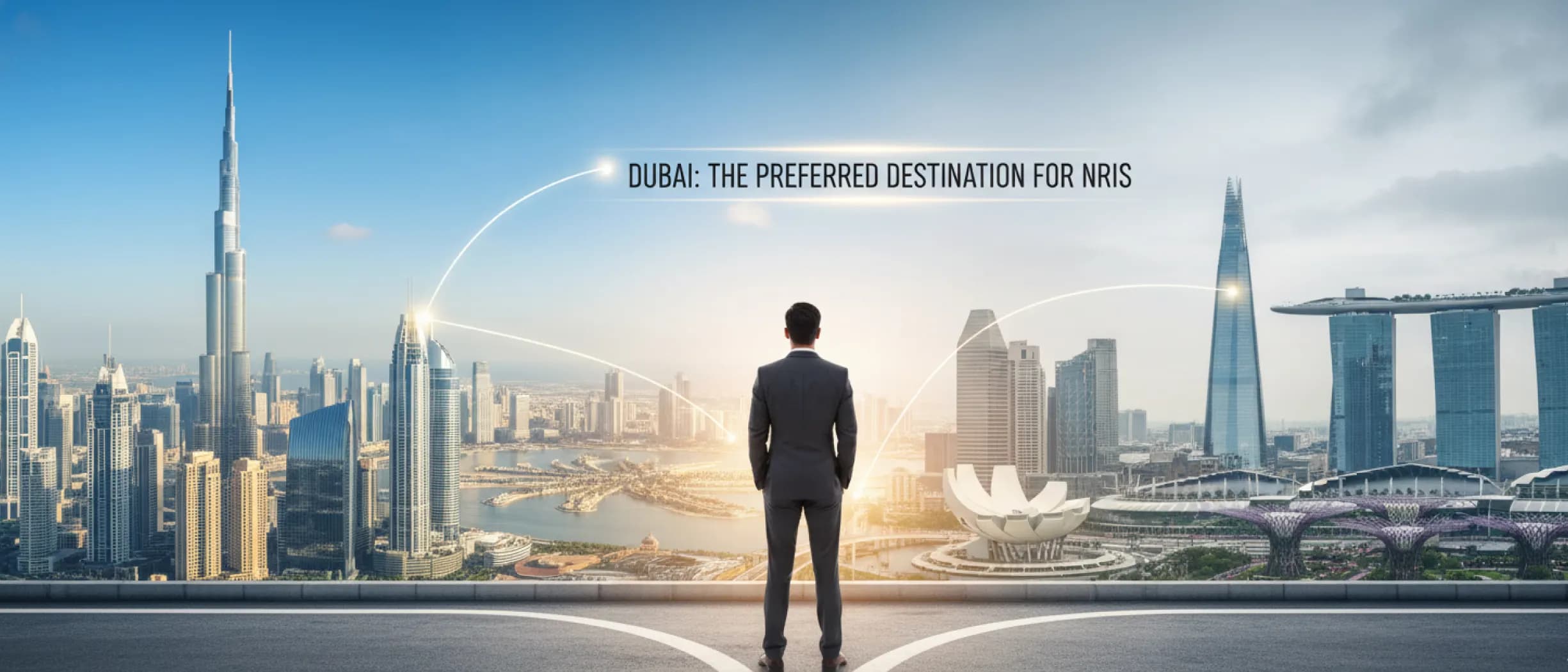
Adil Raza Khan | November 3, 2025
_1762008015.webp&w=1920&q=75)
Dubai Freehold vs. Leasehold areas continue to be a major point of interest to foreign investors and property buyers seeking to know more about ownership legislation in the UAE. Freehold ownership means that you can own the property and the land indefinitely. On the other hand, leasehold ownership in Dubai means that you have the right to use a property over a specific period, usually 30-99 years.
This APIL guide clarifies all the aspects of Dubai Freehold vs. Leasehold areas, including associated costs, ownership rights, advantages and disadvantages, and how foreigners can buy property in Dubai confidently in 2025.
Freehold in Dubai means that you own the property and the land it is situated on. This form of ownership is registered at the Dubai Land Department (DLD) and gives you all the rights, such as the right to sell, rent, or even leave the property as an inheritance.
Expats and other foreign nationals can purchase in special areas called freehold zones, which were launched in 2002 to lure global investors. Through the Dubai 2040 Urban Master Plan, these regions are constantly expanding, which means more prospects of full ownership.
Freehold ownership offers permanence, making it best for those wanting a long-term investment or residence.
A leasehold property in Dubai provides the right to use or occupy the property within a certain time, which is usually 30-99 years. The freeholder retains the ownership of the land that may be a developer or even a government agency. At the expiry of the lease, the freeholder regains the ownership unless the two parties decide to renew the lease.
The leasehold houses tend to be 20-30 percent lower than the freehold homes and provide a cheaper entry point to the Dubai property market, particularly when the aim is to invest or live in the short term.
Dubai Freehold Areas vs Leasehold options serve the investment and the resident alike - the luxury-laden beachfront apartments to the affordable city homes.
Comparing the freehold vs leasehold property in Dubai, the central difference is in the property ownership and control:
The Dubai land department governs both forms of ownership, and thus, there is transparency and security to all investors, including local and foreign investors.
Price is among the key differences in the freehold vs leasehold Dubai comparison.
Freehold properties are highly priced because of the long-term ownership privileges whereas leasehold properties offer good entry gate to Dubai housing market.
Comparing Dubai freehold and leasehold cost it is not only the cost of purchase, but also the freeholders will incur maintenance and service expenses and leaseholders can pay renewal fee or management fee at a later date.
Each of the two ownership models also has its own benefits based on the objectives.
Thinking How Can Foreigners Buy Property in Dubai?
Foreign investors can buy freehold property in Dubai in designated zones. The process is straightforward and governed by the Dubai Land Department (DLD).
Foreigners have the opportunity to purchase property either in cash or with the assistance of approved mortgage lenders. The cost of buying property in Dubai includes transfer fees (4%), registration fees, and agent commission.
The most common question asked by many buyers is, What documents are required to buy property in Dubai? The procedure is easy when buying a freehold or leasehold property, but it has to comply with the legal specifications of the Dubai Land Department (DLD) and RERA. It also helps to have the right documents ready to make the transaction easy and clear.
After all documents are submitted, the DLD checks the ownership rights and grants Title Deed-certifying your complete freehold ownership or long-term leasehold interest.
Tip: To avoid delays or compliance errors, it is preferable to seek the services of a registered real estate agency in Dubai, such as Apil Properties, so that all the paperwork complies with the standards of DLD and RERA.
To convert leasehold property to freehold in Dubai, apply at the Dubai Land Department (DLD), the area of which is freeholdable, pay conversion fee and series of title deed, and receive a new title deed.
The properties are not all eligible, and it is possible to consult professionals at Apil Properties to find out if it is possible and to address the paperwork without wasting time.
Although it is a luxurious destination brand, Dubai has affordable freehold prices to a first-time buyer and investor.
The following are some of the lowest priced freehold property in Dubai (as of 2025):
These regions may offer easy access to investments, complete benefits of total ownership, and stable rental returns.
The insight on Freehold vs Leasehold UAE ownership assists investors to diversify in various Emirates:
Dubai is the most investor-friendly emirate with well-delineated laws between freehold and leasehold properties.
Under the Dubai 2040 Urban Master Plan, additional mixed-use and residential developments have been included in the freehold list including Dubai Creek Harbour, Rashid Yachts and Marina, and Dubai South.
In 2025, investors can expect:
The demand for Dubai Freehold vs Leasehold areas demand will keep increasing as the global investors seek safe and good-paying real estate opportunities in the UAE.
Yes, leasing property in Dubai can be good when done in the short term or when one has a tight budget. It comes with reduced initial expenses, prime locations, and options of living. Nevertheless, it is not as good at long-term wealth-building as ownership of freehold property is.
At the expiry of the 99-year leasehold period, the property passes into the possession of the freeholder unless it is renewed or extended. The tenants have an option of negotiating the terms of renewal, and the property does not necessarily pass to the leaseholder. The costs and terms of renewal are different according to area and agreement.
As an expat, first-time buyer, or investor, Apil Properties will help you in buying property in Dubai, whether freehold or leasehold, and ensure you have purchased the right property!
Contact Apil Properties now to find out the most favorable property deals in the most popular freehold and leasehold communities in Dubai.
A freehold property gives full ownership of the home and land to the buyer.
A leasehold property grants ownership rights for 30–99 years, not the land itself.
Yes, foreigners can own freehold properties in designated Dubai zones.
Yes, leasehold homes are cheaper and ideal for short- to mid-term stays.
The property returns to the freeholder unless the lease is renewed.
Apply via the Dubai Land Department and pay the conversion fee.
Yes, most Dubai banks offer mortgages to eligible foreign buyers.
Popular freehold zones include Palm Jumeirah, Downtown, and Business Bay.
Leasehold zones include older areas like Deira and parts of Bur Dubai.
Leasehold properties are generally 20–30% cheaper than freehold ones.
Yes, it can be sold, but only for the remaining lease term.
Freehold suits long-term investors, while leasehold benefits short-term buyers.

WRITTEN BY
Adil Khan is a Dubai luxury real estate expert with over 13 years of experience in the UAE property market. He is the Chairman of APIL Properties.

To transfer property from India to Dubai, To move property between India and Dubai, residents have to adhere to the Liberalised Remittance Scheme (LRS) by RBI, utilise legal banking facilities, and observe FEMA provisions.
The real estate market of Dubai appeals to Indian investors who seek to have stable returns, world infrastructure and ownership free of taxes. At Apil Properties, we assist Indian investors in this cross-border movement; whether it is in compliance or in title transfer. House purchase in Dubai is no longer the preserve of the rich; now, the first time buyers and those interested in another home can join the process.
This APIL guide clarifies the legal procedure, documents needed, taxation, and online solutions to facilitate property transfers.

Over the years, Indian investors have been seeking their international property portfolios in London and Singapore. But by 2025, a new trend dominates investment charts — NRIs choose Dubai over London and Singapore for lifestyle and long-term wealth growth.
The shift is not only emotional – but it is economic. Dubai has had an increase on rental returns, zero property tax, a long-term residency visa, and a currency pegged to the US dollar – which London and Singapore cannot help matching. This is the reason why the Indians are more certain than ever before about investing in the Dubai property market.
Let us discuss how this change occurred - and why Dubai is the wiser investment option among NRIs in 2025.

Buying a Second Home in Dubai for Indian Nationals has become a lifestyle and wealth planning trend. Dubai has now become the best international destination for the Indian population based on stable property prices, visa incentives, and a location that is closer to India, which promises the Indian population a secure and rewarding second home.
This guide by APIL Experts discusses the main advantages, costs, the most popular regions, and how Indian nationals can purchase a second home in Dubai in 2025-26.